

"OER: A Field Guide for Academic Librarians" by Andrew Wesolek, Jonathan Lashley et al. Open Educational Practice and Professional Learning. Gooru. 30,000 Works of Art by Edvard Munch & Other Artists Put Online by Norway's National Museum of Art. Next time I make it to Oslo, the National Museum of Art, Architecture and Design ranks high on my to-do list.
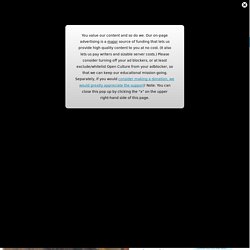
The next time I make it to Oslo will also count as the first time I make it to Oslo, since the tendency of the city itself to rank high on the world's-most-expensive places lists (and at the very top of some of those lists) has thus far scared me off of booking a flight there. But if you can handle Oslo's formidable cost of living, the National Museum's branches only charge you the equivalent of five bucks or so for admission. And now they've offered an even cheaper alternative: 30,000 works of art from their collection, viewable online for free. If it all seems overwhelming, you can view the National Museum's digital collection in sections of highlights: one of pre-1945 works, one of post-1945 works, and one of Edvard Munch.
The National Museum's digital collection offers perhaps your best opportunity to begin to get a sense of the scope of Munch's art. Open Up Resources Announces First Full Math Curriculum—And Its Plans for Profitability. Library Babel Fish. According to a new study uploaded in preprint form to PeerJ and profiled in Science, subscription-based publishing is a doomed business.
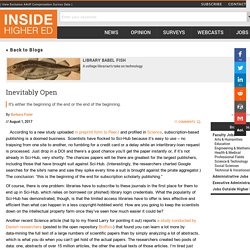
Scientists have flocked to Sci-Hub because it’s easy to use – no traipsing from one site to another, no fumbling for a credit card or a delay while an interlibrary-loan request is processed. Just drop in a DOI and there’s a good chance you’ll get the paper instantly or, if it’s not already in Sci-Hub, very shortly. The chances papers will be there are greatest for the largest publishers, including those that have brought suit against Sci-Hub.
(Interestingly, the researchers charted Google searches for the site's name and saw they spike every time a suit is brought against the pirate aggregator.) The conclusion: “this is the beginning of the end for subscription scholarly publishing.” I have no idea where we’re going with this. But look at how much change we’ve adapted to in recent decades. The 40 Best Places to Learn Something New Every Day — ReadThink (by HubSpot) The 40 Best Places to Learn Something New Every Day Learn something new and get smarter with these awesome sites and courses.
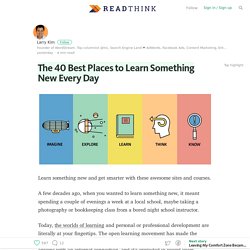
A few decades ago, when you wanted to learn something new, it meant spending a couple of evenings a week at a local school, maybe taking a photography or bookkeeping class from a bored night school instructor. Today, the worlds of learning and personal or professional development are literally at your fingertips. The open learning movement has made the opportunity to get smarter in your spare time completely accessible to anyone with an internet connection, and it’s exploded in recent years.
The 49 best free websites and apps to learn something new — The Mission. The 49 best free websites and apps to learn something new Once upon a time, if you wanted to learn something, you had to a) pay a bunch of money, and b) go to a school or classroom, a place specifically dedicated to learning.
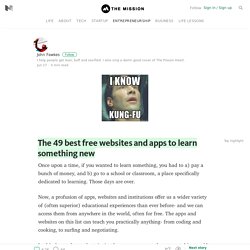
Those days are over. The best free cultural & educational media on the web. 21 Awesome Places to Learn Critical Skills That Will Change Your Life — Life Learning. 21 Awesome Places to Learn Critical Skills That Will Change Your Life Never stop learning.
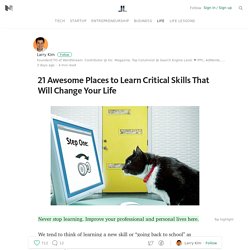
Improve your professional and personal lives here. A Large Collection of Free eTextbooks for High School & College Students. Bookboon is a service that offers free etextbooks to high school and college students.
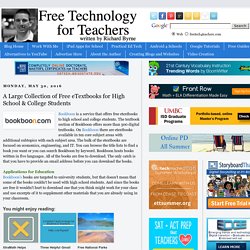
The textbook section of Bookboon offers more than 500 digital textbooks. On Bookboon there are etextbooks available in ten core subject areas with additional subtopics with each subject area. The bulk of the etextbooks are focused on economics, engineering, and IT. You can browse the title lists to find a book you want or you can search Bookboon by keyword. Bookboon hosts books written in five languages. Applications for EducationBookboon's books are targeted to university students, but that doesn't mean that some of the books couldn't be used with high school students. Directory of Open Access Journals. Open Education Resources - Cape Town Global Congress, December 2013. 7 things you should know about open educational resources. A guide to open educational resources.
This guide explains open educational resources (OER) and the benefits that creating, sharing and using OER can provide.
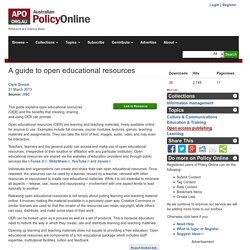
Open educational resources (OER) are learning and teaching materials, freely available online for anyone to use. Examples include full courses, course modules, lectures, games, teaching materials and assignments. Open Educational Resources (OER): Resource Roundup. Resources by Topic: OER, a part of the global open content movement, are shared teaching, learning, and research resources available under legally recognized open licenses -- free for people to reuse, revise, remix, and redistribute.
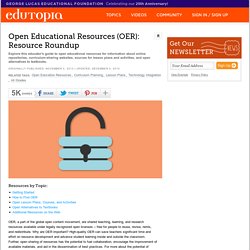
Why are OER important? High-quality OER can save teachers significant time and effort on resource development and advance student learning inside and outside the classroom. Why Open Education Matters. OER Commons. Open educational resources. UNESCO believes that universal access to high quality education is key to the building of peace, sustainable social and economic development, and intercultural dialogue.
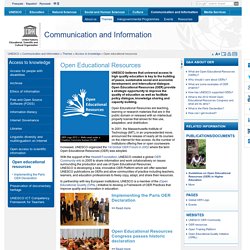
Open Educational Resources (OER) provide a strategic opportunity to improve the quality of education as well as facilitate policy dialogue, knowledge sharing and capacity building. Open Educational Resources are teaching, learning or research materials that are in the public domain or released with an intellectual property license that allows for free use, adaptation, and distribution. In 2001, the Massachusetts Institute of Technology (MIT), in an unprecedented move, announced the release of nearly all its courses on the internet for free access. As the number of institutions offering free or open courseware increased, UNESCO organized the 1st Global OER Forum in 2002 where the term Open Educational Resources (OER) was adopted. Open Education Resources. Open educational resources (OERs)
There is no one, standard definition of open educational resources. However, the following broad definition of OERs from OER Commons seems to be generally accepted by the community: Using Open Educational Resources (OERs), La Trobe Learning and Teaching, La Trobe University. What are OERs?
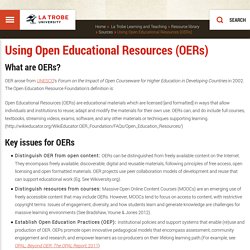
OER arose from UNESCO's Forum on the Impact of Open Courseware for Higher Education in Developing Countries in 2002. The Open Education Resource Foundation's definition is: Open Educational Resources (OERs) are educational materials which are licensed [and formatted] in ways that allow individuals and institutions to reuse, adapt and modify the materials for their own use.
OERs can, and do include full courses, textbooks, streaming videos, exams, software, and any other materials or techniques supporting learning. Key issues for OERs Distinguish OER from open content: OERs can be distinguished from freely available content on the Internet. How can I make my work openly available? Creative commons is an internationally recognised copyright licensing system that enables you to specify copyright on the use of your content.
CC = indicates Creative Commons licensed content; users have to abide by the rules of CC license (as indicated by following symbols). SA = Share Alike. Open Education Resources and Creative Commons Licensing (OER) Creative Commons Licences and how to find OER. ECM #149 OER: Teaching Without Traditional Textbooks @coolcatteacher. Amy Pace is a Presidential Award winning science teacher. She is using “free” OER textbooks for all her courses. 3 things you should know about open scholarship. Education on copyright is insufficient — interview with a teacher — Copyright Untangled. In this post for “Copyright Untangled”, we interviewed Agnieszka Bilska, a Polish teacher and educational leader. We talked with her about technology in education, the role of copyright in the classroom, and the advantages brought about by open education.
Communia: How did it happen that you started to not only use but also create and share educational resources? Agnieszka: It happened a while ago — my interest in creating my own educational materials began over 10 years ago, at the same time when I started to use a computer connected to the Internet and Moodle. 19 places to find the best OERs.